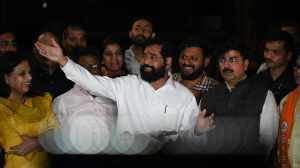God and Constitutions
God and religion, especially Christianity, have become highly controversial subjects in drafting of the Constitution for the European Union ...

God and religion, especially Christianity, have become highly controversial subjects in drafting of the Constitution for the European Union EU. The first 15 draft articles of the Constitution which were released on 6th February 2003 made no mention of any deity or religion. The reason is the differences in the Constitutions of various member States, some of which like the Spanish, Danish and German explicitly mention God or a particular church while others, like the French Constitution, stress the secular nature of the State. Moreover there are many religions and philosophies in Europe and a reference to God and an individual religion could be divisive and would offend Moslems, others of non-Christian faiths, as well as agnostics and atheists. Therefore the first article of the draft Constitution stressed the importance of the 8216;8216;spiritual and moral values8217;8217; on which the EU is based. That was unacceptable to German, Italian, Polish and Slovakian delegates and the Vatican who favoured mention of 8216;8216;God8217;8217; and Europe8217;s 8216;8216;Christian heritage8217;8217;. Other countries with a growing secularist tradition led by France assert that pluralist modern Europe does not need reference to any religion in the Constitution. The debate continues. As yet there is no final draft of the EU Constitution.
During the framing of our Constitution there was animated debate about reference to God in the Constitution. H V Kamath moved an amendment for inclusion of the words 8216;In the name of God8217; at the beginning of the Preamble to the Constitution. Thanu Pillai, whilst declaring that he was 8216;a staunch believer in God8217;, opposed the amendment because that would amount to compulsion in the matter of faith and 8216;8216;a man has a right to believe in God or not, according to the Constitution8217;8217;. Pandit Kunzru felt that Kamath8217;s amendment was 8216;8216;inconsistent with the Preamble which promises liberty of thought, expression, belief, faith and worship to everyone8217;8217;. Shri Rohini Kumar Chaudhuri opposed because he belonged to 8216;8216;Kamrup where the Goddess Kamakhya is worshipped8217;8217; and 8216;8216;we who belong to the Sakthi cult, protest against invoking the name of God alone. 8230; If we bring in the name of God at all, we should bring in the name of the Goddess also8217;8217;. That evoked laughter which did not amuse the President of the Constituent Assembly, Dr. Rajendra Prasad who admonished members that 8216;8216;it is bad as it is that we have brought in the name of God in our discussion. We should not become flippant about it8217;8217;. Kamath8217;s amendment was negatived which led him to bemoan, 8216;8216;This, Sir, is a black day in our annals. God save India8217;8217;. Our Constitution was amended in 1976 and the word secular was included in the Preamble but again there was no mention of God. Kamath would have been horrified and probably predicted doom for our country.
Complicated Laws and Disembarkation Card
Much litigation can be avoided if statutes are brief and are drafted with clarity. Present day laws tend to be prolix and difficult to understand. Our Income Tax Act qualifies for the first prize. It is a model of complex and complicated legislation. It has 12 Schedules and 298 Sections, including Sections 35ABB,35DDA, 80HHBA, 80JJAA and 80VVA. After the operative part of the main section there is a Proviso to be followed in another sub-section by an Explanation, which is a misnomer because far from explaining it confuses matters. In between there comes a retrospective amendment. A veritable maze indeed.
It is impossible for an average intelligent tax payer to make any sense of the various provisions. Judges and lawyers too have to read the relevant sections more than once to understand their meaning and effect. One wonders if there is some method in this madness. However lawyers can ill afford to complain because they are the main beneficiaries. Many Income Tax practitioners and Chartered Accountant would face the grim prospect of steep dip in their income if our Income Tax Act was simple and clear. Obviously they are indifferent to the Bard8217;s admonition 8216;8216;Blow, blow thou winter wind, Thou are not so unkind as man8217;s ingratitude8217;8217;. And is it not sheer ingratitude on their part not to have erected a statute to the draftsmen of this legislation which ensures them a steady and lucrative income? Unfortunately excise and customs legislation have also been infected by the twin viruses of prolixity and complicity.
The latest to enter the race is the Disembarkation Card for arriving Indians in faint print with several columns: place of birth, country of birth, date of issue of passport, place of issue 8212; city and country 8212; date of expiry and so on. Apparently there is a national trait against brevity which is also painfully evident in the speeches of some ministers and politicians, the legal submissions of some eminent jurists and alas, in some judgments of our apex court.
- 01
- 02
- 03
- 04
- 05































